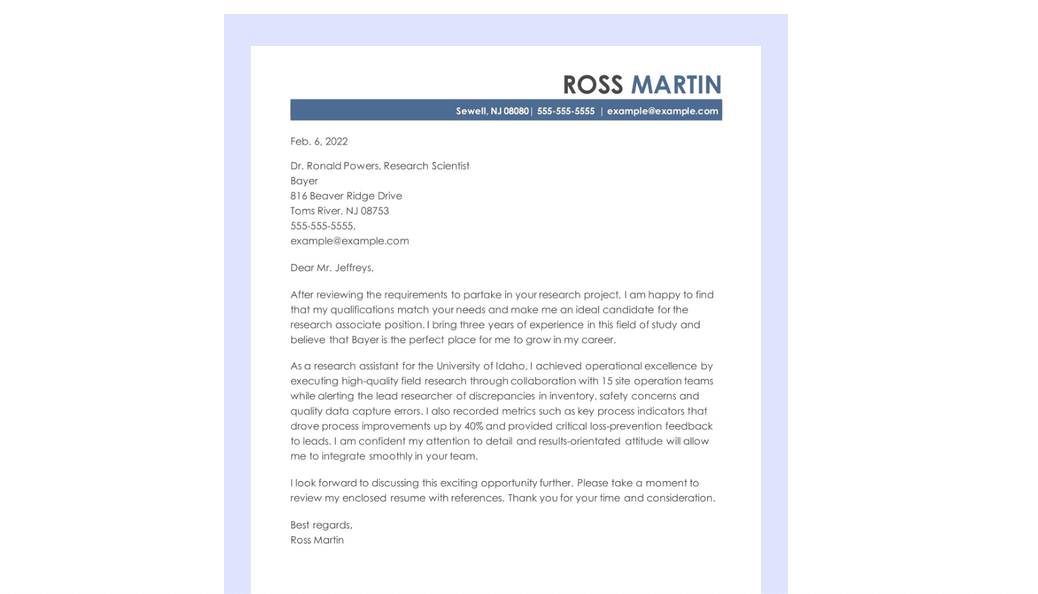How To Write A Cover Letter For Research Assistant?

Image: https://unsplash.com/photos/man-sight-on-white-microscope-9vnACvX2748
Getting hired for a research assistant position can help you build professional skills and increase your chances of being admitted to medical school. Top schools prefer applicants with experience in a research position, as it shows your dedication and interest in scientific progress.
However, to land a job on a research project, you need a persuasive resume and a cover letter in the first place. If writing a research position cover letter puzzles you, you're in the right place.
In this blog, you will find:
- A good example of a research assistant cover letter
- 8 Practical tips to write a letter for research assistant positions, and
- 5 Mistakes to avoid in your letter.
Want to increase your chances for a desired research assistant position? Order a professional resume. Our expert will work one-on-one with you to showcase your unique selling points and strengthen your application for research projects. Student discounts up of to 20% are available!
Example of a research assistant cover letter
The best research assistant cover letters are neatly structured, adapted to the job posting, and demonstrate passion for your chosen field.

Image: https://www.resumehelp.com/cover-letter-examples/research-assistant
Why is this a good cover letter?
- This letter has a visually balanced structure and takes less than one page, which is the ideal length for a student's cover letter.
- It mentions previous research assistant experience at the university. Moreover, this candidate boasts achievements (like improving processes by 40%) and focuses on relevant skills, such as attention to detail and the ability to deliver results.
- The letter is personalized for a particular position at Bayer. It also ends with a call to action and expresses enthusiasm.
How to write a winning letter for a research assistant position?
A good letter should briefly summarize your research skills, include a few achievements, and explain why you are a good fit for this research project. Here is how to write such a letter.
Research the target position
The content and structure of your letter will depend on what your target research position entails and what the organization looks for in a candidate.
Start with doing your research. Read the job posting carefully and pay attention to the qualifications and research focus they demand. Find out more about the institution and department you are applying to. Evaluate their programs and ongoing projects. Such an investigative approach will help you create an effective cover letter tailored to their needs.
Use a professional salutation
Begin your letter by addressing the hiring person by name. You can research their name online or contact the institution and ask to whom address your letter. Look them up on LinkedIn or the organization's website to get a sense of who they are. When in doubt use a Dear Hiring Manager as a salutation.
Craft a catchy opening paragraph
In the first paragraph of your research assistant cover letter, you want to catch their attention. It's best not to use creative opening lines and not to write please review my resume for my qualifications at the very beginning.
To write an attention-grabbing opener, add the name of the position you are applying for and the key qualifications that align with the research assistant job requirements. Or, you may express your enthusiasm about the institution and its projects, and tell that you are excited to contribute.
Emphasize achievements
In the letter body, write about your educational background and research experience. Choose 3-4 qualifications required for the research assistant position and explain how you meet these criteria. For example, if the position asks for experience in conducting scientific research, tell about your data analysis and research projects and their results.
Remember to illustrate your words with numbers, percentages, and examples. A cover letter with figures will show hiring managers that you can deliver results, not only do what you are assigned, and that you care for the outcome of the project.
Do not list skills without examples from real life. Say, if the job description asks for organizational skills, tell about the situation when you prioritized tasks, delivered results under pressure, and managed time while working as a part of a research team.
Keep in concise
Your research assistant cover letter should be short and up to the point. No need to list your academic and research experience in full - this makes little sense for a job application process.
Ideally, your cover letter should be 3-5 paragraphs long, and no longer than one full page. Keep out any irrelevant details. Say, if you already have research experience in your field, remove irrelevant projects and awards from high school. If you are yet to gain research experience, discuss your research interests, your future plans as a researcher, and what excites you about the field of study.
To write a standout cover letter, make it not about yourself, but about the institution/department in the first place. Before you write something, think about if the organization will be interested.
End with a call to action
In the closing paragraph, reiterate your strengths that make you an ideal candidate and add a call to action. Write that you are excited to meet them in a job interview. Or, go further and mention that you will get in touch with them to ask about the status of your application.
Write in plain English
Academic cover letters often require a specific language that resonates with scholars and researchers. While it's important to showcase your intelligence, it's equally crucial to communicate clearly. Use academic terminology wisely and make it understandable even for people who are not familiar with your field. Avoid slang and jargon that may confuse the reader.
Tailor it to the target position
To make your job search a success, adapt a letter to every single undergraduate research position you apply for. Sure, that sounds like a lot of work. However, sending the same cover letter everywhere will not show the hiring manager why they should hire you over others.
Adapt a cover letter specifically for the role based on the institute's requirements and expectations. Thus, there's a higher chance that your research assistant cover letter will be noticed and land you an interview.
Revise before sending
Before sending your cover letter, take some time to review it and fix errors. Correct any spelling or grammar mistakes that could make a negative impression. Make sure that information is accurate and you've included everything you wanted to highlight.
Top 5 cover letter mistakes to avoid
When reviewing your cover letter before sending, make sure it doesn't have these popular mistakes:
- Using overly casual language - a well-written cover letter should use a neutral, professional tone. Avoid words you use in conversations with friends.
- Using an AI-generated text - while AI tools can be helpful in improving and polishing your letter, you shouldn't use them to write your letter from scratch.
- Keeping it too personal - when writing a cover letter, don't include personal details or circumstances. Make it all about your research experience.
- Underselling yourself - avoid negative statements like "I am probably not the best candidate for the position". If you don't meet all the criteria, focus on other amazing achievements and strengths you have.
- Clumsy formatting - you only have one chance to make a great impression. Poor formatting, inconsistent fonts, and large chunks of text can spoil the impression right from the onset.
Get an expert to edit your cover letter
Before you submit your resume and cover letter, it is helpful to show them to an expert. Our skilled editors can review your letter for consistency, logic, and content, and improve it to help you get noticed. The editor will also correct any mistakes to ensure that you make a flawless impression.
FAQ
How long should a cover letter for a research assistant be?
Keep your letter concise and engaging, without making it too short or too long. Aim for 3-4 paragraphs to introduce yourself, highlight your skills and experiences, and express your enthusiasm for the role. Thus, you will keep the letter informative without overwhelming the hiring manager with too much information.
How to write a research assistant cover letter with no experience?
Even if you don't have prior research experience, a cover letter can emphasize your diverse background, unique life experiences, or relevant academic achievements. It is not uncommon for a research assistant applicant to have no experience. Yet, be sure to show enthusiasm about joining the research team and being exposed to research.
Recommended reading:
- How To Write Effective Email That Get Opened
- 12 Common Cover Letter Don'ts Everyone Should Know
- 3 Reasons to Hire Someone to Write My Cover Letter
- How To Write An Email To Get A Job ? ResumePerk
- Secrets to Writing White Papers from Cover Letter Writers
- Cover Letter Assistance: Knowledge-Based Tips


